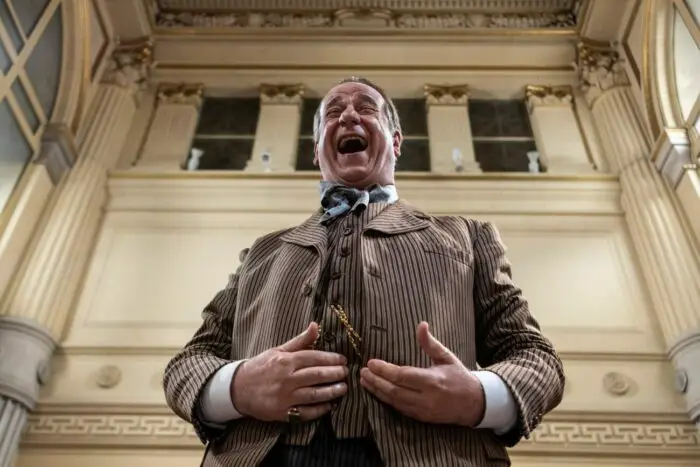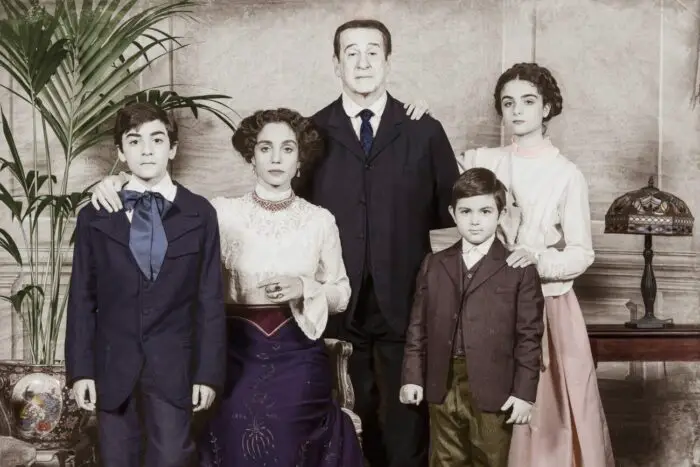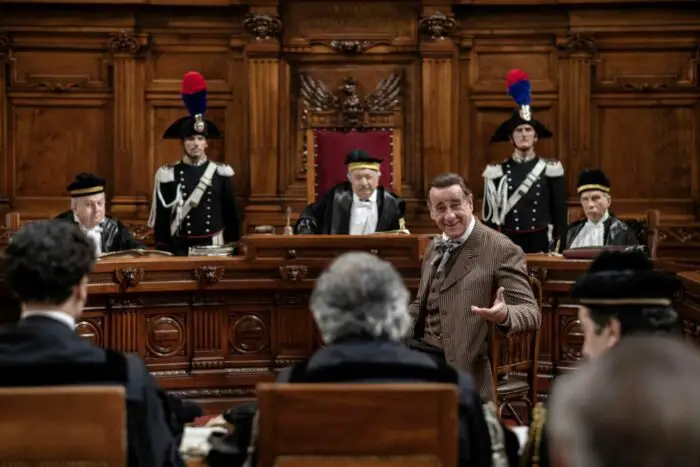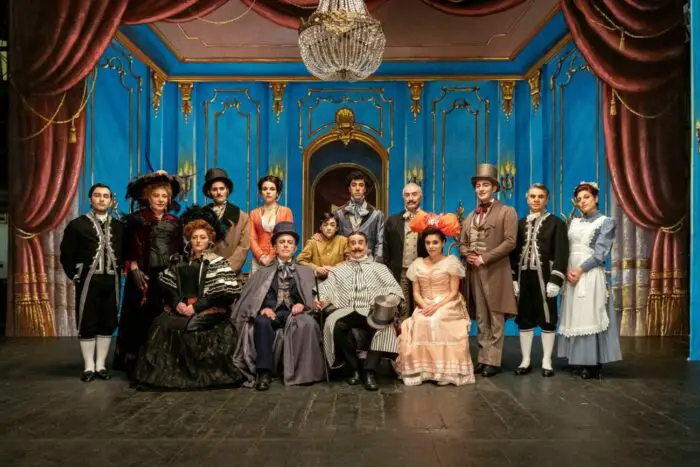At the start of the twentieth century, before cinema took its foothold on the continent’s imagination, the play was the thing, the world a stage. And in Naples, the great stage comedian Eduardo Scarpetta is indisputably, inarguably The King of Laughter. In this, a riotously comic and yet touching historical drama from Italy’s Mario Martone, Eduardo’s touch is golden: having risen from humble beginnings, he’s made himself a rich man, graced with an extended family and thousands of adoring admirers. A parodist at heart—the Weird Al of the Belle Époque, one might say—he’s about to risk everything with his newest production.
Fresh from its successes on the international festival circuit, where, among other awards, it was nominated for The Golden Lion and earned star Toni Servillo Best Actor at Venice, The King of Laughter debuts this week on North American streaming services. With its lovingly crafted re-creation of the Belle Époque theatrical scene and its richly drawn character portrait of a man coming to face his own limitations, The King of Laughter channels the riotous energy of the theater with an outsize love for its characters and themes.

Eduardo (Servillo) has, as The King of Laughter begins, reached the pinnacle of his already-long career. His garrulous, gullible stage character—Felice Sciosciammocca—has even replaced the long-loved Pulcinella in the hearts of Neapolitan audiences. At every sold-out performance his audience breathlessly anticipates his appearances and vigorously applauds his routines. But reaching the top has not come easily for Eduardo, and he’s determined to stay there. He’s a man whose ego is satiated by applause. And so he must, among other things, plan a legacy, a way for his character and his troupe to continue even when he himself ages out of the starring role.
That troupe is a large and complex one. Most of them are members of his family. Rosa (Maria Nazionale) has borne him three children, including Vincezo (Eduardo Scarpetta), the first-born son whose commitment to the theatre waxes and wanes. Luisa (Christiana Dell’Anna), is the company’s seamstress, but she is mother too, to three more of Eduardo’s children: Eduardo the younger (Alessandro Manna), Titina (Marzia Onorato), and Peppino (Salvatore Battista). As the years pass, the family patriarch must consider which of his sons might inherit his role, and he must plan his estate’s accommodations for his legitimate and illegitimate heirs both.

One night, Eduardo attends a production by the great Italian poet Gabriele D’Annunzio: The Daughter of Iorio, a tragic peasant love story. He is smitten, and his creative impulses kick in. As he watches, enraptured, he cannot help but re-imagine the tragedy as a comedy. And soon he embarks upon what will prove a significant gamble: Eduardo announces his intentions to stage a parody of D’Annunzio’s play. It’s a decision made in a fleeting moment, inspired less by the tragedy onstage than by Eduardo’s own parodic muse. But it will prove historic.
To his credit, Eduardo visits the cagey D’Annunzio to request his written permission to stage the parody, but he is rebuffed. Determined, he proceeds regardless. Does the parodist need permission? On opening night, D’Annunzio’s acolytes, the poets and playwrights of the new generation who adore their master, sabotage the production with catcalls and jeers, drawing down the curtain on Eduardo’s production. To save face, Eduardo dons once again his Sciosciammocca mask, and manages at least to quell the audience’s rage.
But the relief is short-lived when Eduardo learns he is being sued for plagiarism by D’Annunzio. With nearly all of Italy’s literati on the tragedist’s side, ready to testify on his behalf, it seems the deck is stacked against “The King of Laughter.” And so, as the first historic copyright lawsuit in Italy begins, Eduardo faces not only the courtroom trial that may end his career, but numerous trials in his family life as well. It will take the performance of a lifetime to persuade an Italian court of his own innocence and the integrity of his artistry as a parodist.

What director Martone (The Mayor of Rione Sanita) and co-writer Ippolita di Majo have created with the script is something special indeed. On the face of it, a century-old plagiarism trial would not, on its own, necessarily seem to make for promising cinema. But to begin, the script for The King of Laughter adroitly focuses keenly on their charming, flawed, and complex protagonist, especially at a pivotal moment in his life and art. The charges of plagiarism Eduardo Scarpetta faces threaten not only his livelihood but his very artistry: in order to defend himself, Eduardo must debase himself and acknowledge that his own productions are little more than base parodies of a superior artist’s great works. A scene where Eduardo learns from his lawyer of a defense strategy that will likely clear him by acknowledging the inferiority of his own artistry illustrates just how even acquittal will prove injurious.
And as Eduardo, a man whose ego is matched only by his ability to impregnate, whose rapturous audiences have instilled in him a need to perform, the veteran actor Toni Servillo, a longtime collaborator of Martone’s, is sublime. The script requires that the character’s actions often be questionable, but his intentions honorable. With his wide-open eyes, sallow gape, and middle-age paunch, Servillo is perfectly cast as a physical comedian able to bring audiences to tears of laughter, but he is also able to imbue his character with a pathos that enriches the film. Surprisingly even most of the supporting characters are drawn in ways that make them three-dimensional, far more than mere plot devices.

That, though, requires several scenes less than crucial to the resolution of the central conflicts, and so at times The King of Laughter may flag. But never for too long: once Servillo as Eduardo gains the opportunity to perform, in front of an audience, even such a skeptical one as the courtroom in his plagiarism case, the film jumps quickly back to life.
And throughout, the lavish, loving set and costume design brings the theater of the Neapolitan Belle Époque back to life. So too does Renato Berta’s elegant cinematography: though the film is, in some ways, a biopic of a man who for a time reigned as “The King of Laughter” in early twentieth-century Italy, its mise-en-scène adopts the handsomely-lit, carefully-crafted, subtly-shot, and invisibly-edited style of classical cinema. Its intentions are less to detail the logistics of the famous 1904 case plagiarism case largely excepting parody than to craft, in intimate detail, the rich and garrulous story of a man whose greatest strengths belie his greatest frailty.
The King of Laughter debuts on North American streaming services Nov. 25, 2022.



